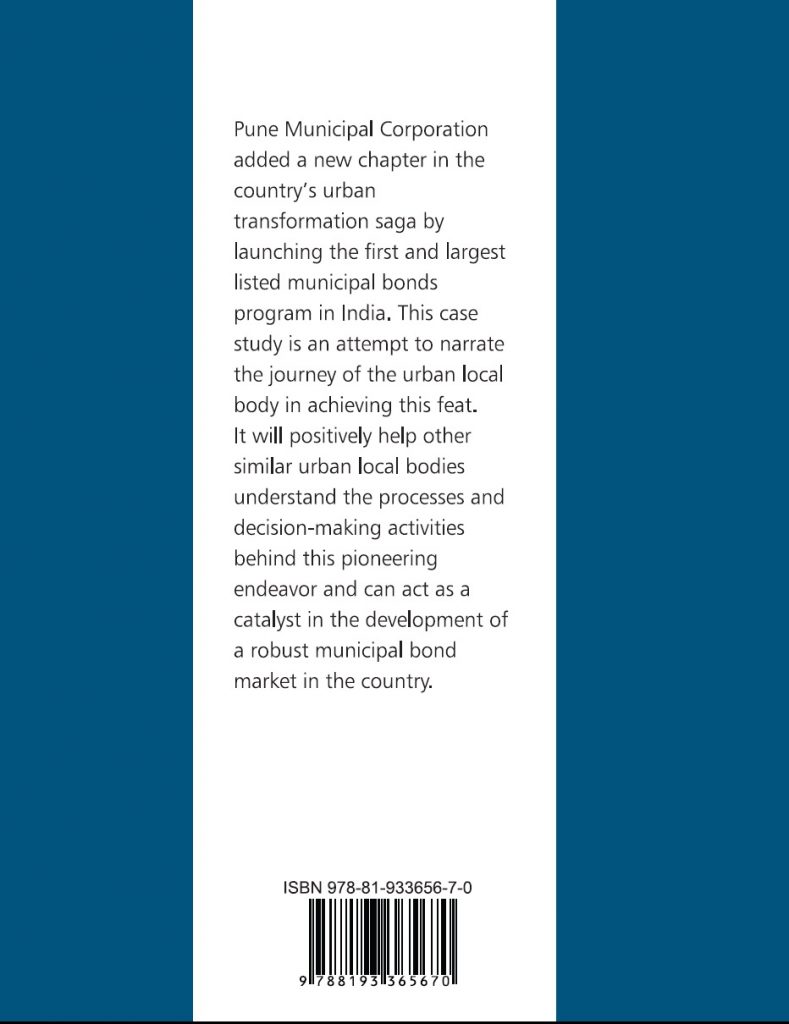Authored by Prasad Thakur (PGP 2014 – 2016)
Reviewed by Goutham Nagoor Katta (PGPX 2015) and Utkarsh Garg (PGP 2014)

Prasad Thakur (PGP 2014-16, IIM Ahmedabad) has co-authored the book with Kunal Kumar (IAS & Joint Secretary at MoHUA- Govt. of India), Ulka Kalaskar and Kunal Mandwale (Chief and Dy. Chief Accounts & Finance officers at Pune Municipal Corporation, respectively). Prasad also received active support and inputs from Mr. William Streeter (Senior Advisor, Department of the Treasury, United States of America) during the process of writing this book.
Prasad was a founding member of the ‘City Transformation Unit – War Room’ at Pune Municipal Corporation (PMC). His workstreams included public finance, international partnerships, environmental sustainability and smart-city projects. He has authored and contributed to several articles and reports published by international organizations like The World Bank, International Solar Energy Society, Climate Policy Initiative (USA), ICLEI (Germany), The Hindu, Metrology Research Institute (Finland) etc. At PMC, he has managed a portfolio of 35+ projects, including the first and largest listed municipal bonds program in India. Previously, he worked with the Mahindra and Tata Groups in the areas of clean energy and smart mobility. During his tenure as the Secretary of the Forum for Industry Interaction (India’s largest student consulting body), he forged project based partnerships with several governments, private corporations, NGOs, academia, start-ups and chambers of commerce like the Confederation of Indian Industry (CII), FICCI etc. He has chaired several student delegations at national and international conferences on topics like clean energy, trade and commerce, innovation, union budget etc.
The author was the Project Manager and Consultant to one of Pune Municipal Corporation’s historic endeavors, namely, launching India’s first and largest listed municipal bonds program. In this context, he was an integral part of the project and process innovations unfolding in one of the biggest urban local bodies in India. He was of the firm belief that the experiences and learnings of Pune Municipal Corporation in preparing itself for the bond program were invaluable and that they must be consolidated and documented in a systematic manner. Such a repository can serve as a template for other urban local bodies for accessing financial markets for funding their infrastructure projects. He received active support and encouragement from Mr. Kunal Kumar (erstwhile Municipal Commissioner of Pune) and Mr. William Streeter (Senior Advisor, USA’s Department of Treasury) during the process of writing this book.
The subject-matter of the book tries to elucidate the techno-financial-legal processes completed by Pune Municipal Corporation (PMC) in the run-up to the issuance of its municipal bonds program at Bombay Stock Exchange (BSE). It also elaborates the several compliance requirements fulfilled by PMC during the post-issuance phase. Considering the fact that it is India’s first and largest listed municipal bonds program, several of these processes are novel in the context of urban local body governance in the country (eg : debt capacity measurements, structured escrow payment mechanisms, agreements with depository service providers etc.) . The book’s target audience includes decision makers in the government, institutional investors, international financial organizations, think-tanks and the academia.
The book resonates a confidence that introduction of innovative financial instruments across Urban Local Bodies (ULBs) in India for bridging their viability gap funding requirements for infrastructure development, may prompt them to become more prudent and disciplined in the management of their financial resources in their journeys towards becoming more ‘liveable’ cities. Such innovations will be a positive step in establishing synergies between the objectives of our financial markets and ULBs, towards making India a developed country.
Reviewed by Mr. Goutham Nagoor Katta
In the context of the rapid urbanization seen in the India, it is important to future-proof our cities with state-of-the art infrastructure. For the creation of such people-centric infrastructure, it is important to create financial resources in a sustainable manner. In an ecosystem where limited revenue streams have to experience the competing pulls of various spending priorities, it is important to explore and deploy innovative financial instruments to ensure adequacy of funds.
Given the fact that progressive frameworks of governance like ‘reform, perform and transform’, ‘co-operative and competitive federalism’ and ‘local autonomy’ are being promoted, the time is apt for cities to transition towards becoming less dependent on grants and disbursements from state/ union governments and generate novel options to finance priority projects under their jurisdiction.
The book ludicidly narrates the experience and learnings of Pune Municipal Corporation in depolying one such innovative instrument, namely, municipal bonds, to fund an ambitious infra-project. On June 22nd 2017, PMC’s bond program became the first and largest in India to be listed on a recognized stock exchange.The book explains in detail the various analysis (eg : debt capacity measurements), compliances (SEBI Regulations 2015, Maharashtra Municipal Corporations’ Act etc.) and permissions (from state government, general body etc.) completed by PMC. It aslo introduces prudent fiscal management processes like debt management policy, structured escrow payment mechanisms for debt servicing etc.
The book is an attempt to promote peer-learning and experience-sharing across Urban Local Bodies and government departments in India. It can be used by private corporations, multilateral agencies and other non-government organizations for investment related decisions. It may also be of academic value to students, faculty members and other scholars in the areas of public policy, public finance and macroeconomics.
Reviewed by Mr. Utkarsh Garg
A definitive guide for policy makers and strategic advisors on municipal bonds. The book combines global best-practices with the peculiarities of Indian market, and lays down a path for other modern Indian cities to follow. Lucid and exhaustive, this is a must-read for those wanting to understand the myriad regulations and procedures around the nascent market of municipal bonds.


